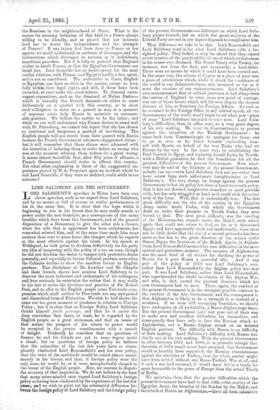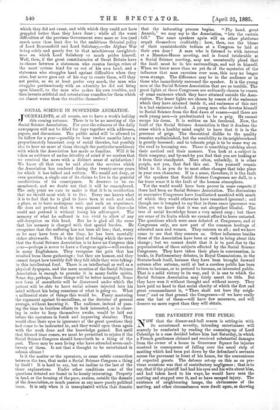LORD SALISBURY AND THE GOVERNMENT.
LORD SALISBURY'S speeches in Wales have been very clever speeches, such as we expect from Lord Salisbury, and by no means so full of venom as earlier performances of his in the same line. It is clear that the hope which is beginning to rise in his breast that he may really accede to power under the new franchise, as a consequence of the many troubles which have beset this Government, and of the general disposition of a Democracy to give the other side a chance, when the side that is uppermost has been unfortunate, has somewhat sobered him, and at the same time made him more anxious than ever to press home the charges which he regards as the most effective against his rivals. In his speech at Welshpool, he took pains to disclaim definitively for his party any idea of tampering with the policy of a tax on corn, though he did not disclaim the desire to tamper with protective duties generally, and especially to favour Colonial produce, even when the Colonies decline to show the smallest favour to English produce. This disclaimer of Mr. Lowther and Mr. Chaplin and their friends, shows how anxious Lord Salisbury is to disavow the most indiscreet and enthusiastic of his colleagues, and how seriously he entertains the notion that it may really be his fate to revise the doctrines and practice of Sir Robert Peel, and to offer to the English people some Fair-trade compromise which shall neither be Free-trade nor any antiquated and discredited form of Protection. We wish he had shown the same not too great measure of prudence in relation to Foreign Policy ; but it is clear that on Foreign Policy Lord Salisbury thinks himself facile princeps, and that he is under the deep conviction that there, at least, he is regarded by the English people as a great statesman, and that on issues of that nature the prospect of his return to power would be accepted in the greater constituencies with a tumult of delight. Evidently he considers that on questions of finance he and his friends are yet to some degree under a cloud ; but on questions of foreign policy he believes that the calamities of the last few years have so triumphantly vindicated Lord Beaconsfield's and his own policy, that the voice of the multitude would be raised almost unanimously in his favour, and that, if foreign policy were the only issue, he would be, as it were, metaphorically clasped to the breast of the English people. Now, we venture to dispute the accuracy of that impression. We do not believe in the least that many sober-minded men regard Lord Salisbury's foreign policy as having been vindicated by the experience of the last few years ; and we wish to point out the substantial difference between the foreign policy of Lord Salisbury and the foreign policy
of the present Government—a difference on which Lord Salisbury piques himself, but on which the great majority of the Liberal Party are not in any degree disposed to compliment him.
That difference we take to be this. Lord Beaconsfield and Lord Salisbury went in for what Lord Salisbury calls a farsighted policy. They looked so very far ahead that they signed secret treaties, of the practicability of one of which no statesman in his senses ever dreamed. The Secret Treaty with Turkey, for instance, was from the first, and necessarily, a dead-letter. There were no means by which it could have been carried out. In the same way, the seizure of Cyprus as a place of arms was a piece of ostentation which, while it shook the confidence of the world in our disinterestedness, only increased so far as it went the number of our embarrassments. Lord Salisbury's own announcement that at critical junctures it had always been the custom of England to seize some new point of vantage, was one of those boasts which will for ever inspire the deepest distrust of him as Secretary for Foreign Affairs. So soon as he returned to the Foreign Office in any critical epoch, all the Governments of the world would begin to ask what new "place of arms" Lord Salisbury intended to seize next. Lord Slisbury's difficulties, then, in office were, to a very great degree, of his own making. He went to Constantinople to protest against the iniquities of the Tutkish Government ; he came back from Constantinople to apologise for them, and to go as near as he dared towards embroiling himself with Russia on behalf of the very Turks who had set Europe by the ears. In the same way, in establishing the Dual Control in Egypt, and replacing Ismail Pasha by Tewfik, with a British guarantee, he laid the foundation for all the greatest difficulties of the present Government. Now, whatever may be said of the disasters of the present Government,
nobody can say—even Lord Salisbury does not say—that they have arisen from such unfortunate farsightedness as Lord Salisbury's. The very charge he brings against the present Government is that its policy has been a hand-to-mouth policy, that it has not devised imaginative remedies to meet possible evils, but has only struggled as hard as it could with the actual evils of the hour. Well, that is undoubtedly true. The first great difficulty was the rise of the mutiny in the Egyptian Army under Arabi Pasha, with which the Government dealt as, under their promise to Tewfik Pasha, they were bound to deal. The next great difficulty was the swelling of the Mohammedan crusade under the Mahdi, with which again they could not refuse to deal, so far as it threatened Egypt, and have apparently dealt not ineffectually, since there can be little doubt that the rise of a second pretender has been more or less due to the great disasters of the armies under Osman Digna, the lieutenant of the Mahdi. Again, in Afghanistan, Lord Beaconsfield invented his own difficulties in the most cynical and gratuitous manner. The invasion of Afghanistan was the most fatal of all devices for checking the power of Russia, for it gave Russia a powerful ally. And if any part of the policy of 1878 was Lord Salisbury's own, rather than Lord Beaconsfield's, the Afghan policy was that part. It was Lord Salisbury, rather than Lord Beaconsfield, who superintended the whole incubation of the Afghan War, and who, in fact, caused the greatest disasters which his own Government had to meet. There, again, the conduct of the present Government is in the strongest possible contrast to the conduct of the late Government, and the consequence is that Afghanistan is likely to be a strength to us instead of a weakness. If we were still occupying Candahar, we should have undergone, in all probability, a Russo-Afghan siege there. But the present Government have not gone out of their way to make new and needless difficulties for themselves, and consequently they have only to face the Russian attack on Afghanistan, not a RussoAfghan attack on an isolated English garrison. The difficulty with Russia is no difficulty of their making. Lord Salisbmy's difficulty with Russia was chiefly one of his own making. With the present Government in office between 1874 and 1880, it is probable enough that the crisis of 1878 would never have occurred. Our Government would so heartily have supported the Russian remonstrances against the atrocities of Turkey, that the whole matter might have been settled without any Russo-Turkish War at all, and if such a war had occurred, it would have led to a treaty far more favourable to the peace of Europe than the actual Treaty of Berlin.
We maintain, then, that the greater difficulties which the present Government have had to deal with,—the mutiny of the Egyptian Army, the invasion of the Soudan by the Mahdi, and the attack of Russia on Afghanistan,--have all been calamities which they did not cause, and with which they could not have grappled better than they have done ; while all the worst difficulties of the previous Government were more or less (and much more than less) due to the ambitious Oriental policy of Lord Beaconsfield and Lord Salisbury,—the Afghan War being solely and purely due to that mischievous farsightedness on which Lord Salisbury so much prides himself. Well, then, if the great constituencies of Great Britain have to choose between a statesman who creates foreign crises of the most serious kind for us out of his own head, and a statesman who struggles hard against difficulties when they arise, but never goes out of his way to create them, will they not prefer, as we at least prefer very much, the man who struggles pertinaciously with an adversity he did not bring upon himself, to the man who makes his own troubles, and then invents artificial and ostentatious remedies for them which are almost worse than the troubles themselves ?



































 Previous page
Previous page